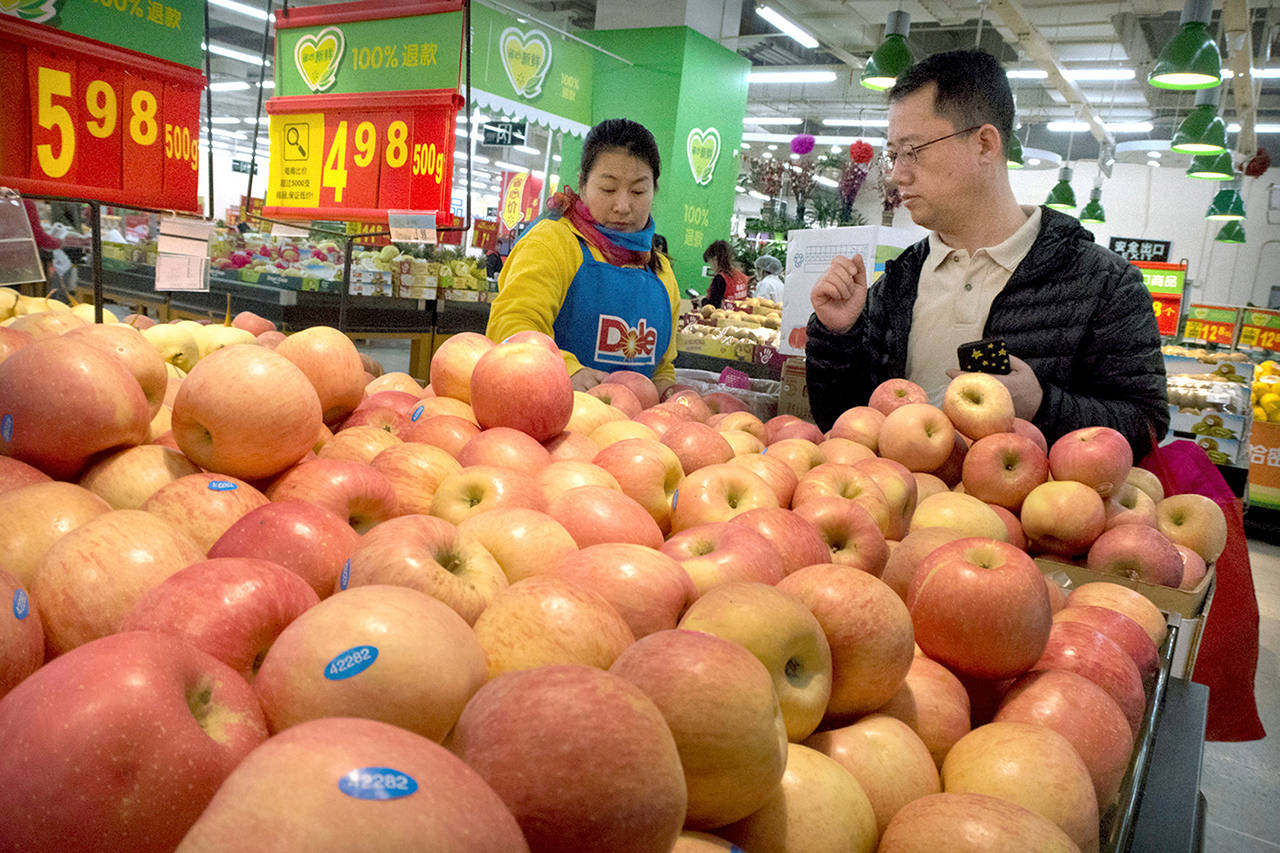By The Herald Editorial Board
Some figures to keep in mind:
In Washington state, 4 in 10 jobs depend on international trade, including those of apple, wheat and soy farmers, craft distillers and winemakers, aerospace engineers and machinists, software developers and e-commerce employees, truck drivers and port workers and thousands of other trades and professions.
In 2016, that meant 332,600 jobs tied to exports from the state, third only in the U.S. behind Texas’ 910,300 jobs and California’s 683,000, according to the International Trade Commission.
The value of Washington-produced exported goods reached $7 billion in 2017. Among our top trading partners are China, Canada, Japan, the United Arab Emirates, South Korea, Taiwan, Norway, Mexico, Saudi Arabia and Russia, the top ten accounting for about 41 percent of that total value. China alone accounted for nearly 24 percent of that $7 billion.
Which explains why producers, government officials, trade advocates and others are watching with some anxiety as the Trump administration continues talks to renegotiate the North American Free Trade Agreement with Canada. U.S. and Mexico trade representatives reached a tentative agreement last month, but talks with Canada have made less progress with both President Trump and Canadian Prime Minister Justin Trudeau threatening to walk away without a deal, although Canadian representatives expressed greater optimism Friday that negotiations were likely to continue through September.
While China remains the state’s top trading partner, the state’s exports to Mexico have increased 700 percent in recent years, while Canada’s have doubled. Washington state’s apple growers supplied $250 million worth of apples to Mexico last year, compared to $50 million exported to Chinese markets.
NAFTA’s trade arrangements with Mexico and Canada, taking effect nearly 25 years ago, were long overdue for an update, said Lori Otto Punk, president of the Washington Council on International Trade, the Seattle-based trade policy organization.
But it’s concerning, Otto Punke said Friday in a phone interview, that talks with Canada and Mexico were preceded by harsh talk, tariffs and threats of retaliatory rounds of more tariffs.
“We are concerned because tariffs are not the right way to resolve disagreements. We need serious negotiation for a meaningful chance at an agreement that doesn’t scare off a lot of business and investors from Washington state,” she said.
There are legitimate trade issues to be raised with China, Canada and other nations. China has used the leverage of its huge potential markets to force American corporations to accept unfair concessions regarding intellectual property. Canada has imposed significant tariffs for years on dairy products and softwood lumber.
But one consequence of the tariffs and adversarial approach to renegotiating these deals is that foreign customers for Washington products have started looking for other producers in countries where tariffs haven’t affected prices and the supply chain. Even if agreements are forthcoming, the state still will have lost opportunities to strengthen trade ties and keep those customers.
And while the U.S. is at least talking with Mexico and Canada, the U.S. and China still are involved in tit-for-tat rounds of tariff threats with no indications of fruitful talks and more notifications of cancelled orders for Washington goods and services.
The U.S. tariffs on Chinese goods are likely to result in higher prices here, while China’s retaliatory tariffs will hurt sales of Washington products there. Those higher prices and lost sales may not be obvious yet, Otto Punke said, but price increases could hit, in untimely fashion, during the holiday shopping season.
All of this has been complicated because the Trump administration has elected to disrupt global trade on a grand scale with allies and rivals alike and at the same time.
It used to be news, Otto Punke said, when one particular product was hit with a tariff. Now we’re seeing a range of industries and nations hit with tariffs and demands for renegotiation of agreements, all at once, she said, resulting in uncertainty for many businesses and their employees.
The Trans-Pacific Partnership, a trade agreement that had been all-but-signed by the U.S. and 11 other Pacific Rim countries at the end of 2016, was tossed aside by Trump. In addition to securing trade agreements that would have held other countries to stricter labor and environmental standards — and countered China’s attempts to gain trading footholds with those countries — the TPP could also have served as a template for updating NAFTA more quickly, with less rancor and fewer impacts here.
Otto Punke and other WCIT representatives are scheduled to visit Washington, D.C., later this month, meeting with the state’s congressional delegation and others to make the case for protecting trade relationships and encouraging fair negotiations.
Congress will have the chance to vote on new trade deals with Mexico and Canada, but those votes aren’t likely to come until next year, which makes trade and the Washington state jobs that depend upon it, key election issues.
Already, Otto Punke said in June, the trade war with China has theatened to hurt Washington state workers and farmers without clearing a path forward on trade negotiations with China.
President Trump may yet get the deals he seeks with our international trading partners. But the costs in increased prices, job opportunities and the economy are now beginning to roll in.
Talk to us
> Give us your news tips.
> Send us a letter to the editor.
> More Herald contact information.

























